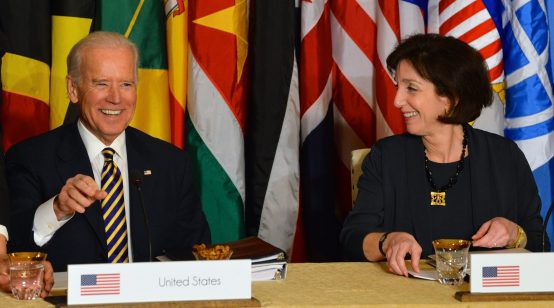
This article is the second part of a two-part analysis that examines how national security interests have hastened energy transitions in the past and might drive the current-day transition.
Two weeks ago, I described how national security, namely Britain’s desire for military dominance at sea, prompted the Royal Navy to transition from wind to coal in the nineteenth century and coal to oil in the early twentieth. This decision to switch to oil precipitated a global search for supply security and brought new supplies to the market on a massive scale. Ample supplies created low prices and nurtured a full-scaled transition in the commercial transport and power sectors.
In the context of today’s low-carbon transition, ambitious national policies in Germany, France, China, and others are boosting investment in green energies but are not changing the energy mix quickly enough. Fossil fuels still account for over 80% of global energy consumption and two-thirds of carbon emissions. Climate change, meanwhile, continues to wreck havoc on the world. The last three years, 2015, 2016, and 2017, have been the hottest on record.
How might national security interests arrest this problem and hasten this latest transition? There are a slew of potential ways that clean energies can address national security concerns, ranging from naval fuels to climate change and energy security. But this potpourri of interests itself may be the problem. States don’t know exactly what to embrace, and they are reticent to commit to policies that are uneconomic in the short-term, even for the sake of long-term benefits. Moreover, the military transportation sector, especially the all-important air and naval transportation sectors, appear dependent on oil for the foreseeable future.
Military transport fuels
Can the military transport sector again hasten a transition to clean energies?
In the era of fossil fuels, the global hegemon has always been the leading naval power. Britain came first with coal, followed by the United States with oil. The same may not be true in the future, however, especially with the nascent growth in supersonic weapons, satellites, stealth fighters, and long-range missiles. For now, though, states seem to believe naval power still matters, partly because of concerns about oil-supply security. China and India are both oil-poor, but have built new blue water navies to protect sea lanes and oil supplies.
The United States is leading the development of two new fuel sources – rechargeable batteries and biofuels – that could replace oil in the military transportation sector. Rechargeable batteries, however, have only begun to make headway in passenger vehicles and trucks. Hydrogen fuel cells have penetrated the commercial and military transportation sectors. NASA is using hydrogen as a rocket fuel.
The U.S. Navy also remains concerned about its energy security, and that of the global economy upon which the liberal international order rests. It has initiated a partial shift to biofuels, which transform algae and other plants into diesel. The scale of this shift, however, is so small that it can best be characterized as a side project.
Multiplying security threats of climate change
With a naval transition not on the horizon, could climate change create national security threats that hasten the transition?
Often in the peak of summer, analyses appears that highlights how climate change is a critical, if not the most critical, national security threat. Climate change is inducing induced population movements, food shortages, temperature increases, and rising sea levels that destabilize local and regional politics.
Climate change threatens the United States’ position of global dominance. By ignoring climate change, it has bequeathed leadership to China in developing the clean energy technologies that will define the future. Meanwhile, U.S. allies struggle under the onslaught of environmental calamities. The only force capable of reversing this decision may be the U.S. military, the largest employer on the planet and most powerful lobby in Washington, but it has not taken meaningful action.
China’s top-down leadership, on the other hand, has allowed it to pivot to clean energies. Renewables fit seamlessly with China’s national security goals. They reduce imports of fossil fuels and mitigate the health and environmental costs to its land and people. Yet neither the United States nor China will likely see the global problem of climate change as an existential threat until its consequences have become too pronounced locally to reverse.
Energy security, cyber and artificial intelligence
Energy security has always been the sine non qua for any power aspiring to global dominance. Yet could the changing technology of warfare, most notably with the rise of cyber warfare and artificial intelligence (AI), make energy security even more fundamental?
Cyber warfare has already entered into countries’ military-strategic calculations. States are taking steps to defend their electric grids against cyber attacks, which cause real economic pain and strategic vulnerability.
Russian President Vladimir Putin told children last year: “Artificial intelligence is the future, not only for Russia, but for all humankind. It comes with colossal opportunities, but also threats that are difficult to predict. Whoever becomes the leader in this sphere will become the ruler of the world.” China invested $4.5 billion in AI from 2012 to 2017 and plans another $1 trillion by 2030. The EU and France in particular have also made significant investments, whereas the United States has no clear strategy.
Defending the electricity grid and harnessing AI requires energy security and inherently encourage a transition to producing as much power from local sources, ranging from renewables to nuclear, as possible. Even non-local gas offers greater energy security: supplies are increasingly abundant and available regionally, unlike oil, which is concentrated in Russia, the United States, and the Middle East. China has embraced gas with greater urgency; imports increased by 27 percent from 2016 to 2017 and jumped 22 percent from June 2017 to June 2018, all with the goal of increasing its energy security.
Nationalism ascendant
Top-down government policies driven by national security threats and interests must catalyze the low-carbon transition. The international political environment has been entrenching into nationalist boxes for years. Rising powers China and Russia have been leading this movement, and the Trump Administration seems hell-bent on following their lead, even if the rest of the U.S. government fights to maintain the liberal international order.
The relationship between energy and world power has always been intimate. The country that takes steps now to lead in new energy technologies will reap the rewards and obtain energy security. The unintended consequences of these moves including AI are terrifying to imagine, but so is maintaining the status quo.






Excellent piece of work dr. Bowlus. I shall look for the other part of your publication to get your full view on the subject.
It would be interesting to know what is expected to be, in this connection, the part to be played by small nations like Lebanon. You must know of course that we are expected to start receiving the benefits of oil and gas extraction by the year 2025. I wish someone could give me a rough idea of the quantities of oil and gas that one could hope to extract per year after that date.
If you can help there, I would be grateful.
Best personal regards
, from George Sabat, ACMA, Lebanon my personal email address is: georgesabat32@gmail.com